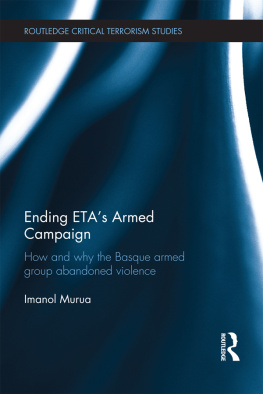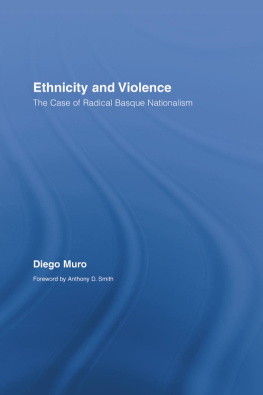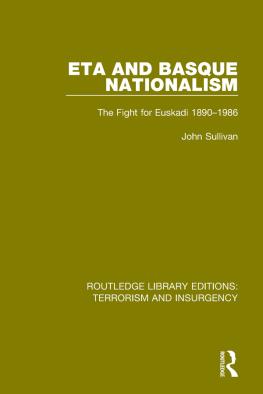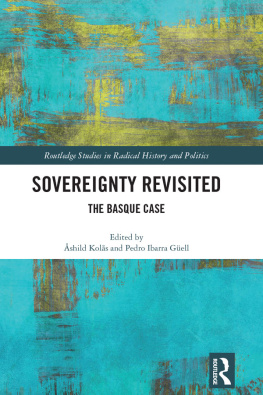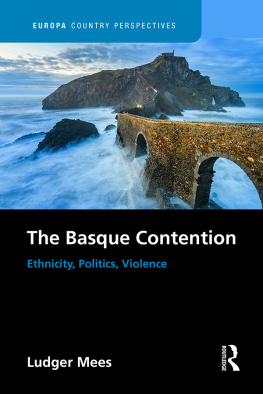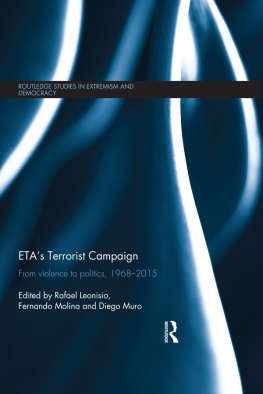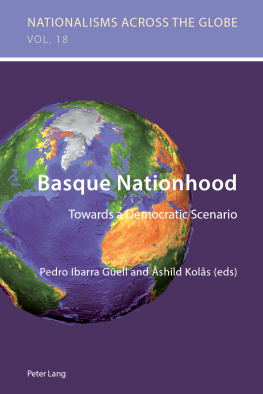Ending ETAs Armed Campaign
This book explains how and why the Basque separatist armed group ETA decided to end its armed campaign against the Spanish state.
The ETAs armed campaign for Basque independence lasted fifty years and led to more than 800 casualties. This book analyzes the factors that led to ETA ending its campaign of violence in 2011, despite having yet to achieve its political objectives. It explains how the Basque pro-independence movements political leadership won an internal battle and brought ETA to a position in which abandoning violence was the only feasible choice. The work argues that the key factor leading to the cessation of violence was the loss of support for armed struggle within the pro-independence social base, and it examines why and how that support decreased so decisively. Written by a former journalist, the narrative is based on more than thirty interviews, including former members of ETA, Spanish judges, former ministers of the Spanish government, political leaders of all Basque political partiesfrom the Nationalist Left to the Partido Popular (PP)and international mediators. As such, it is the first book to recount in detail the inside story of the internal struggle within the Nationalist Left movement, and particularly between the political party Batasuna and ETA.
This book will be of much interest to students of political violence, ethnic conflict, nationalism, Spanish politics, security studies, and IR.
Imanol Murua is Professor of Journalism at the University of the Basque Country, and a former political correspondent. He has a PhD in Basque Studies from the University of Nevada, Reno, USA, and is the author of several books in Spanish and Basque.
Series: Routledge Critical Terrorism Studies
Series Editor: Richard Jackson
University of Otago, New Zealand
This book series will publish rigorous and innovative studies on all aspects of terrorism, counter-terrorism and state terror. It seeks to advance a new generation of thinking on traditional subjects and investigate topics frequently overlooked in orthodox accounts of terrorism. Books in this series will typically adopt approaches informed by critical-normative theory, post-positivist methodologies and non-Western perspectives, as well as rigorous and reflective orthodox terrorism studies.
The Making of Terrorism in Pakistan
Historical and social roots of extremism
Eamon Murphy | Critical Perspectives on Counter-Terrorism
Edited by Lee Jarvis and Michael Lister |
Lessons and Legacies of the War on Terror
From moral panic to permanent war
Edited by Gershon Shafir, Everard Meade and William J. Aceves | Researching Terrorism, Peace and Conflict Studies
Interaction, synthesis, and opposition
Edited by Ioannis Tellidis and Harmonie Toros |
Arguing Counterterrorism
New perspectives
Edited by Daniela Pisoiu | Hamas, Jihad and Popular Legitimacy
Reinterpreting resistance in Palestine
Tristan Dunning |
States of War since 9/11
Terrorism, sovereignty and the war on terror
Edited by Alex Houen | Russias Securitization of Chechnya
How war became acceptable
Julie Wilhelmsen |
Counter-Radicalisation
Critical perspectives
Edited by Charlotte Heath-Kelly, Lee Jarvis and Christopher Baker-Beall | Ending ETAs Armed Campaign
How and why the Basque armed group abandoned violence
Imanol Murua |
First published 2017
by Routledge
2 Park Square, Milton Park, Abingdon, Oxon OX14 4RN
and by Routledge
711 Third Avenue, New York, NY 10017
Routledge is an imprint of the Taylor & Francis Group, an informa business
2017 Imanol Murua
The right of Imanol Murua to be identified as author of this work has been asserted by him in accordance with sections 77 and 78 of the Copyright, Designs and Patents Act 1988.
All rights reserved. No part of this book may be reprinted or reproduced or utilized in any form or by any electronic, mechanical, or other means, now known or hereafter invented, including photocopying and recording, or in any information storage or retrieval system, without permission in writing from the publishers.
Trademark notice: Product or corporate names may be trademarks or registered trademarks, and are used only for identification and explanation without intent to infringe.
British Library Cataloguing-in-Publication Data
A catalogue record for this book is available from the British Library
Library of Congress Cataloging-in-Publication Data
Names: Murua, Imanol, author.
Title: Ending ETAs armed campaign : how and why the Basque armed group abandoned violence / Imanol Murua.
Description: Abingdon, Oxon ; New York, NY : Routledge, 2017. | Series: Routledge critical terrorism studies | Includes bibliographical references and index.
Identifiers: LCCN 2016026133| ISBN 9781138658233 (hardback) | ISBN 9781315619323 (ebook)
Subjects: LCSH: ETA (Organization)History. | TerrorismSpainHistory20th century. | TerrorismSpainHistory21st century. | TerrorismSpainPais VascoHistory20th century. | TerrorismSpainPais VascoHistory21st century. | NationalismSpainPais VascoHistory20th century. | NationalismSpainPais VascoHistory21st century. | Pais Vasco (Spain)HistoryAutonomy and independence movements.
Classification: LCC HV6433.S72 E85684 2017 | DDC 363.3250946dc23
LC record available at https://lccn.loc.gov/2016026133
ISBN: 978-1-138-65823-3 (hbk)
ISBN: 978-1-315-61932-3 (ebk)
Typeset in Times New Roman
by Wearset Ltd, Boldon, Tyne and Wear
This book is the result of fieldwork carried out in the Basque Country in 2013, and research conducted at the University of Nevada, Renos Center for Basque Studies (CBS) from 2011 to 2014. This thrilling intellectual adventure could not have been done in solitude. Above all, I am grateful to my supervisors Joseba Zulaika, from the UNR, and Txema Ramrez de la Piscina, from the University of the Basque Country (UPV/EHU), whose help and guidance have been instrumental for the framing and completion of this investigation. I am also very grateful to all in the CBS for their help, support, and advice during my stay in Reno. I wish to express my gratitude to all faculty, staff, visiting scholars, and fellow researchers of the CBS; special thanks to Kate Camino and Dan Montero for their assistance in everything, and to Joseba Agirreazkuenaga for his advice on the historical section. I am also grateful to Susanne Martin, from UNRs Political Science department, for her advice on terrorism studies literature. I am also appreciative of the great help offered by the Writing Center of the UNR, especially Jonathan DuBois, for their very useful assistance in my struggle with the English language. And I cannot forget the newspaper Berria, whose staff gave me the opportunity to get back into the newsroom during the thrilling days of ETAs final announcement. Finally, I am especially indebted to all the informants and interviewees who gave their time and information, without which this book could not have been produced; most of them are identified by their names, but some of them are not. This book is dedicated to all of them.

